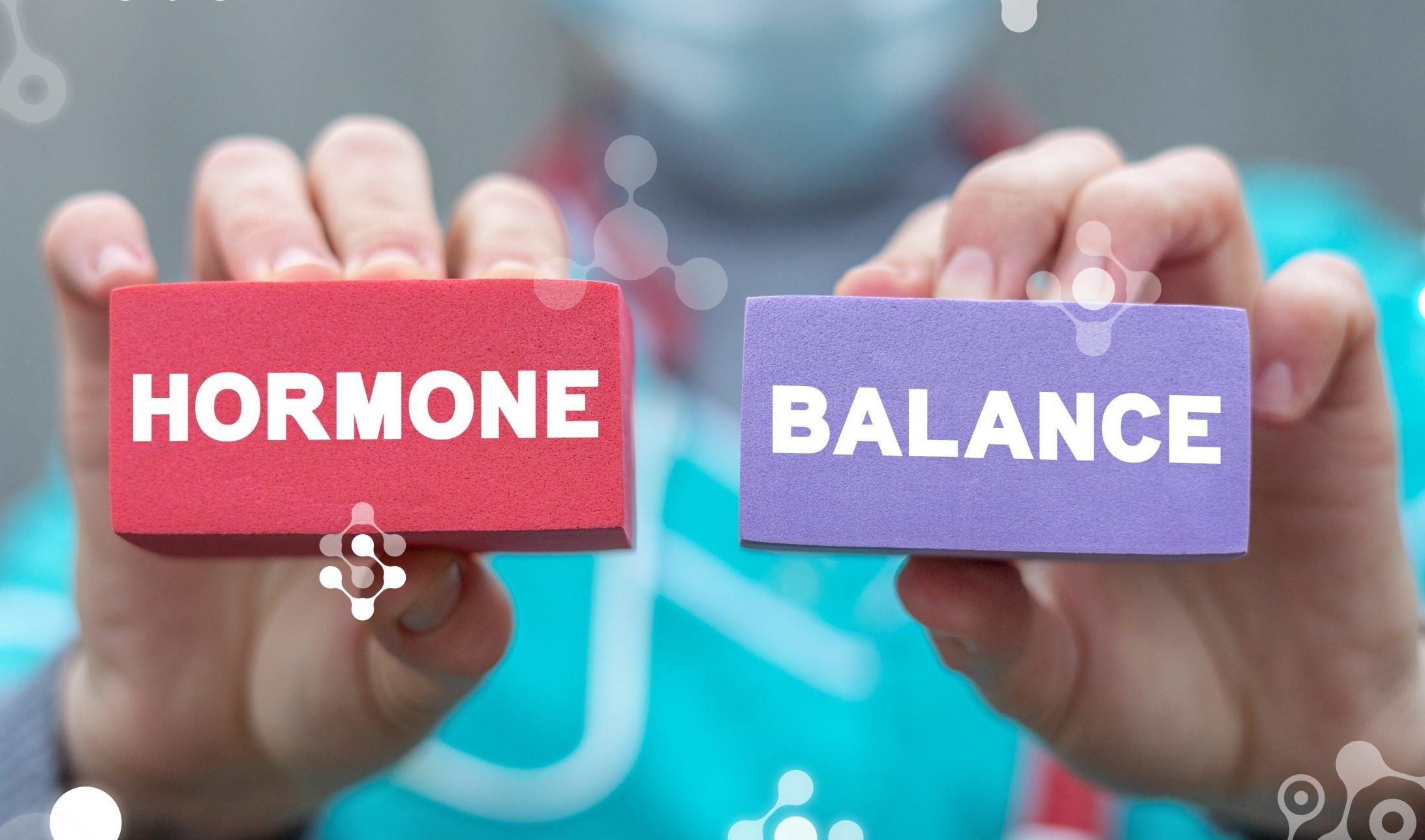Caffeine is considered to be a psychoactive substance and can be addictive for some individuals. However, moderate caffeine consumption is...

HORMONAL BALANCE
HORMONAL BALANCE
Hormonal balance is the state of having the right levels of hormones in the body to help control many important functions, including metabolism, mood, and reproduction.
Ingredients
Specialty
Ingredients
Specialty Ingredients
Goal OVERVIEW
Hormones are chemical messengers that regulate many important functions in your body, including metabolism, reproduction, mood, and sleep. When your hormones are out of balance, it can lead to a variety of health problems, such as weight gain, fatigue, and mood swings. Maintaining hormonal balance is a critical health goal for countless reasons.
Start by embracing a healthy diet rich in fruits, veggies, and whole grains; limit processed foods, sugary drinks, and unhealthy fats. Regular exercise, about 30 minutes of moderate-intensity activity most days, regulates hormones.
Not enough can be said about prioritizing 7-8 hours of sleep to support hormone production. Counter stress with activities like prayer or meditation. Minimize, if not eliminate, smoking and excessive alcohol consumption, which can disrupt hormone levels. Adhering to these strategies fosters hormonal equilibrium and enhances overall well-being.
What You Should Know
Many natural supplements are safe and effective alternatives to prescription drugs. Explore a realm of safe and effective natural supplements, offering viable alternatives to prescription drugs. These supplements can harmonize hormonal equilibrium, elevate free testosterone levels, enhance thyroid performance, and provide relief from menopausal discomfort. Among these options, notable choices are inositol, magnesium, and omega-3 fatty acids. For a broader array of premium specialty ingredients, visit GenMag.com, where an extensive selection awaits.
FOOD FOR THOUGHT
Hormone therapy, a medical approach using hormones to supplement natural production, addresses conditions like menopause, andropause, and hormone-related cancers. It involves estrogen therapy for menopausal symptoms and testosterone therapy to combat low levels in men, additionally for the treatment and prevention of osteoporosis. While offering benefits, careful consideration of risks is essential before starting. These risks include increased blood clots, breast cancer, and heart disease. Discussing age, health history, specific conditions, therapy pros and cons, and personal preferences with a doctor aids in an informed decision.

SHAGANDHA® BY SABINSA
Shagandha® is a standardized powdered extract from the roots of Withania somnifera, commonly known as ashwagandha. Shagandha® offers various health benefits, including reducing stress, anxiety, and insomnia while improving cognitive function, reducing inflammation, and boosting the immune system. It is available in capsules, powders, and teas and is often used in herbal mixtures. Considered to be a breakthrough Adaptogenic.
Sponsored Content
FAQ
Balancing hormones naturally is integral to overall health and well-being. Adopting a holistic approach with a balanced diet rich in whole foods, healthy fats, and fiber can significantly influence hormone regulation.
Managing stress through meditation, yoga, and regular exercise contributes to hormonal equilibrium. Adequate sleep, hydration, and weight management are also crucial. Minimizing exposure to endocrine disruptors, limiting processed foods, caffeine, and alcohol, and consulting healthcare professionals for regular check-ups further support natural hormone balance.
These practices play a vital role in maintaining a harmonious hormonal environment, fostering improved health and vitality.
Hormonal imbalance occurs when there are disruptions in the normal levels of hormones in your body. Hormones are crucial in regulating various bodily functions; imbalances can affect your health. The specific symptoms and health impacts of hormonal imbalance can vary depending on which hormones are affected and the underlying causes.
Here are some ways hormonal imbalance can affect your health:
1. Reproductive Health:
- Hormonal imbalances can lead to irregular menstrual cycles, heavy or painful periods, absent periods (amenorrhea), and fertility issues in women.
- In men, hormonal imbalances can contribute to erectile dysfunction, reduced libido, and infertility.
2. Metabolism and Weight:
- Hormones like insulin, cortisol, thyroid, and sex hormones regulate metabolism and appetite. Imbalances can lead to weight gain or difficulty losing weight.
3. Mood and Mental Health:
- Hormonal fluctuations can impact mood and mental health. For example, serotonin, dopamine, and cortisol imbalances can contribute to mood swings, anxiety, and depression.
4. Energy Levels:
- Hormonal imbalances, notably thyroid hormone or cortisol disruptions, can lead to fatigue, low energy, and difficulty concentrating.
5. Skin Health:
- Hormonal imbalances can contribute to skin issues such as acne, oily skin, dry skin, and changes in skin texture.
6. Bone Health:
- Hormones like estrogen and testosterone play a role in bone health. Imbalances can increase the risk of osteoporosis and fractures.
7. Cardiovascular Health:
- Hormones like estrogen and insulin influence cardiovascular health. Imbalances can contribute to high blood pressure, high cholesterol, and an increased risk of heart disease.
8. Reproductive System Disorders:
- Hormonal imbalances often characterize polycystic ovary syndrome (PCOS) and endometriosis and can lead to fertility issues and other health problems.
9. Thyroid Disorders:
- Thyroid hormone imbalances can lead to hypothyroidism (underactive thyroid) or hyperthyroidism (overactive thyroid), affecting metabolism and overall health.
10. Diabetes and Insulin Resistance:
- Imbalances in insulin, a hormone that regulates blood sugar, can lead to diabetes or insulin resistance, which affects how the body uses glucose for energy.
11. Menopause and Andropause:
- Hormonal changes associated with menopause (in women) and andropause (in men) can lead to various symptoms, including hot flashes, mood changes, and changes in sexual function.
12. Digestive Health:
- Hormones play a role in digestion and gut health. Imbalances can contribute to gastrointestinal issues like bloating, constipation, or diarrhea.
It’s important to note that hormonal imbalances can have interconnected effects on multiple aspects of health, and symptoms can vary widely. If you suspect you have a hormonal imbalance or are experiencing concerning symptoms, it’s recommended to consult a healthcare professional. They can conduct appropriate tests, diagnose any underlying issues, and develop a tailored treatment plan to address the imbalance and its effects on your health.
Maintaining hormonal balance is important for overall health and well-being. While supplements can support hormonal health, it’s important to note that individual needs vary, and consulting a healthcare professional before taking any new supplements is recommended.
Here are some supplements that are commonly used to support hormonal balance:
1. Vitamin D:
- Vitamin D plays a crucial role in hormone regulation. Many people have insufficient vitamin D levels, which can impact hormonal balance.
2. Omega-3 Fatty Acids:
- Omega-3 fatty acids in fish oil supplements can help reduce inflammation and support hormone production.
3. Adaptogens:
- Adaptogenic herbs like ashwagandha, rhodiola, and holy basil help the body adapt to stress and support overall hormonal balance.
4. Magnesium:
- Magnesium is involved in numerous bodily processes, including hormone production and regulation.
5. Vitamin B Complex:
- B vitamins, such as B6 and B12, play a role in hormone synthesis and metabolism.
6. Zinc:
- Zinc is important for hormone production and may help regulate the menstrual cycle in women.
7. Chaste Tree Berry (Vitex):
- This herb is often used to support menstrual cycle regularity and balance hormones in women.
8. Macafem:
- Macafem is a supplement derived from the maca root and is believed to support hormonal balance, especially in women.
9. Probiotics:
- A healthy gut microbiome can influence hormone regulation. Probiotics may support gut health, which in turn can impact hormonal balance.
10. Evening Primrose Oil:
- Evening primrose oil contains gamma-linolenic acid (GLA), an essential fatty acid that can support hormonal balance, especially in women.
11. Black Cohosh:
- Black cohosh is often used to address menopausal symptoms and hormonal imbalances in women.
12. DIM (Diindolylmethane):
- DIM is a compound found in cruciferous vegetables and may support estrogen metabolism and balance.
It’s important to emphasize that while supplements can be helpful, they are not a replacement for a healthy lifestyle. Prioritize a balanced diet, regular physical activity, stress management, and sufficient sleep to support hormonal balance. Before starting any new supplement, especially if you have underlying health conditions or are taking medications, consult a healthcare professional to ensure they are safe and appropriate for your needs.
Related Videos
Articles
Few things rival the exhilarating sensation of the post-workout 'pump.' For those passionate about training, it's a moment of pure...
As a key component in skincare and haircare products, including anti-aging creams and serums, Astrion® provides a holistic solution for...

















